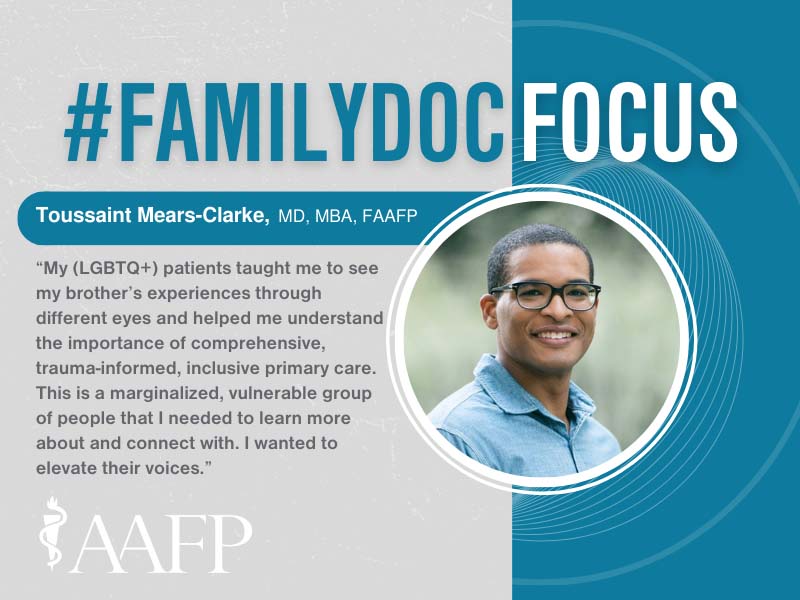LGBTQ+ Ally Aims to Elevate Voices of Vulnerable Group
June 20, 2024, David Mitchell — Jamaica is a paradise for some, drawing millions of visitors to its beaches each year. For many of the Caribbean island’s LGBTQ+ residents, however, that sense of paradise is elusive.

A 160-year-old law makes consensual, same-sex sexual acts punishable by imprisonment of up to 10 years, and discrimination against the LGBTQ+ community remains pervasive. In a 2023 United Nations survey of LGBTQ+ Jamaicans, 75% of respondents said they lacked support from their families, and nearly 70% reported suicidal thoughts.
Toussaint Mears-Clarke, M.D., M.B.A., FAAFP, who grew up in Jamaica before attending high school in the United States, does not identify as LGBTQ+ but wanted to be an ally for his patients who do. That’s how he came to lead the AAFP’s LGBTQ+ constituency.
“I grew up in a very conservative culture,” said Mears-Clarke, who was elected LGBTQ+ constituency co-convener along with Joseph Laterza, M.D., of Greenville, S.C., in April during the National Conference of Constituency Leaders, the AAFP’s leadership development event for women, minorities, new physicians, international medical graduates and LGBTQ+ physicians and allies. “It wasn’t an inclusive environment. I still remember a song by Buju Banton that is incredibly homophobic, but it was sung all the time when I was a child. It specifically talks about shooting gay people.”
Mears-Clarke said his brother, a transgender man, is “the spark that ignited an interest in this specific population.”
“When we were growing up, my brother was probably feeling like he wasn’t really seen as the person that he is,” said Mears-Clarke, who also will serve as a constituency delegate to the AAFP’s Congress of Delegates in September. “When I started taking care of patients who identify as LGBTQ+, their stories had a profound impact on me. For example, I have a queer patient who struggles with substance use disorder. They were abandoned by their family, became homeless, and eventually had to sell their body to survive. My patients taught me to see my brother’s experiences through different eyes and helped me understand the importance of comprehensive, trauma-informed, inclusive primary care. This is a marginalized, vulnerable group of people that I needed to learn more about and connect with. I wanted to elevate their voices. With more people listening, there can be continued change here in the U.S. and at home in Jamaica.”
Mears-Clarke is core faculty at the Dignity Health Methodist Hospital of Sacramento Family Medicine Residency, and he also is director of its family medicine obstetrics fellowship. He attended his first NCCL as a minority delegate for the California AFP in 2021, and he’s held several local and state leadership positions since, including serving as president of CAFP’s Sacramento Valley Chapter for two years before becoming a member of the CAFP Board of Directors last year.
Mears-Clarke said his state chapter’s staff and leaders, as well as NCCL leaders, encouraged him to get involved at the national level.
“If you have any thoughts about leadership, run for a position,” he said. “You’ll learn something even if you don’t win. It’s a beautiful experience in a very supportive environment. And if you are thinking about running for school board or a council, or an even higher office, this is a great platform and place to practice those skills.”
Now Mears-Clarke will be in a leadership role when NCCL returns to Kansas City, Mo., April 24-26, 2025.
“NCCL re-energizes you and reignites you because you’re surrounded by people who not only believe that they can make a difference but are actively working on changing the dynamics of health care,” he said. “It’s really inspiring to meet other people who are out there fighting the good fight, being vulnerable with some of the challenges that we have in taking care of patients, and doing real advocacy work to create policies that improve health care, not just for patients but also for physicians.”
Mears-Clarke was inspired to become a family physician by his own family doctor, who treated him for asthma as a child. He said his father, a teacher, deserved some of the credit for his love of academics, and his mother, for his love for service to others.
“I’m always excited to watch that light bulb turn on for students and residents,” he said. “I also like being on the cutting edge. In an academic setting, at least in a small community hospital, you have the ability to create change pretty quickly, and the students will demand it. They’re like, ‘We need Narcan. We need gender-affirming care in our clinic. We need wellness time. We need to start doing tattoo removal in our clinic.’ And all these things we can do and now are doing. There’s a sense of lightness and brightness when you’re working with new grads from medical school. They’re excited about patients, but they’re puzzled by patients, too. I like to watch that struggle and watch them rise to the occasion.”